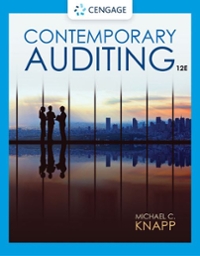Fifteen minutes before the first meeting of Professor Noah DeBerry's graduate auditing seminar, he sat down at
Question:
Fifteen minutes before the first meeting of Professor Noah DeBerry's graduate auditing seminar, he sat down at his desktop computer to retrieve the photo roster for the three-hour evening course.1 While he waited for the roster to appear, DeBerry studied the online newsfeed, which was being flooded with reports of a shocking domestic terrorism attack that had taken place a few hours earlier. When the photo roster finally popped up on his computer screen, one of the 15 students immediately grabbed the professor's attention for two reasons: the black scarf she was wearing and her distinctly Arabic name.
Moments after entering the classroom, DeBerry began checking the course roll.
He asked, as he normally did in his graduate courses, for the students to introduce themselves by "telling us something we should know about you." Razia, the scarfed one, had chosen a middle seat in the first row of the cramped classroom-she was wedged between two female Asian students, the only other international students enrolled in the course. Razia sparked several smiles and friendly nods by revealing she was the proud mother of a rowdy, two-year-old toddler who had recently acquired the bad habit of screaming "Waldo" each time he spied someone wearing a stocking cap.
After checking the roll, DeBerry worked his way through the other administrative tasks on his to-do list. Then he officially launched the course with the always tedious "nuts and bolts" lecture that provided students with a two-hour, condensed review of the fundamental auditing concepts and issues featured in the prerequisite undergraduate auditing course-subsequent class meetings would be highly interactive and primarily involve discussions of auditing cases.
When Professor DeBerry finished his lecture and dismissed the class, Razia lingered in the classroom while he discussed an enrollment issue with another student.
Razia was concerned because two years had passed since she completed her undergraduate auditing course, and many of the topics DeBerry had covered during his two-hour remedial review were no more than vaguely familiar to her. After Razia raised that issue with DeBerry, he suggested she spend a few hours studying the bullet lists of key auditing concepts and elements and other reference materials he had posted to the course website. He assured her that doing so would easily erase any knowledge deficit she might have relative to her classmates. DeBerry also reminded her that the graded exercises in the course were "take home" or "open book" assignments, which meant she could access the online reference materials or her undergraduate auditing text during those exercises if she found it necessary to do so.
Razia dropped by DeBerry's afternoon office hours on several occasions during the first few weeks of the semester to discuss cases assigned for the following class meeting.
Questions
1. Which features of the independent audit work environment make the personal traits or attributes of individual auditors particularly impactful? Explain.
2. Accounting majors from ethnic and other groups underrepresented among the employees of major accounting firms may feel uncomfortable contacting those firms to inquire of employment opportunities. Does this reluctance impose a responsibility on the major accounting firms to "reach out" to members of those underrepresented groups? Why or why not?
3. In the Abercrombie & Fitch case referenced in the Epilogue, Supreme Court Justice Elena Kagan argued that employers must sometimes engage in "awkward" or uncomfortable conversations with employees to determine how to "reasonably" accommodate their religious practices. What policies and procedures can major accounting firms implement to make their work environments more hospitable for individuals across the range of personal traits, including race, color, religion, sex, national origin, sexual orientation, and gender identity?
Step by Step Answer:






